We weren't allowed to meet up in person for a few years there, so everyone went a bit doolally for physical board games once doctors said we could cough directly into each other's eyeballs. We've all calmed down a bit now, but our love for the board game hasn't diminished. That's why we've put together our list of the best board games on PC - that is, the best digital versions of popular board games that you can play online.
The physical quality of board games is something people like about them, it's true, but there are lots of reasons why digital board games are sometimes better. First of all, everything is already set for you - meeples, tokens, dice, and all - which means you don't have to spend ages jenga-ing everything out of and then back into a box. Another benefit is the price. Dropping a bunch of cash on a board game you’re not sure you'll like will make your wallet cry, so digital games are a great way to play for cheap, but also a way of testing the waters. After all, you can always buy the physical copy later on. Finally, board games on PC can be played with pals all around the world at a moment's notice. How hard is it to get four adults to come over to hang at once? Exactly.
We’ve tried to be as diverse as possible with our list of the best board games on PC, from card games to political wrangling, to horror - but you might find that your own favourite board game isn't in the final group. If that happens it means it was number 21, but if you make a good enough case for why it should be included, then it might get added the next time we update our list!
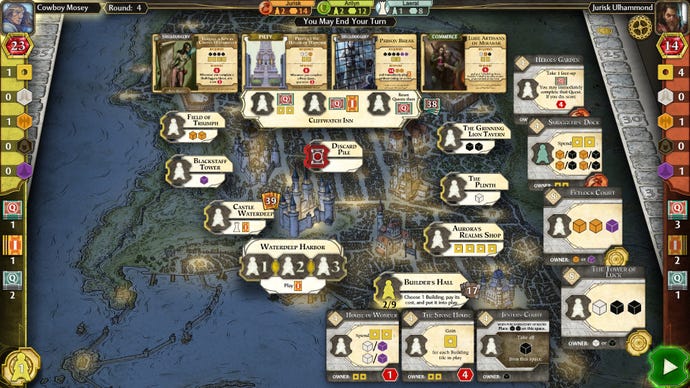
D&D Lords Of Waterdeep has existed as a beloved board game for over a decade at this point, and you can see that fans were excited when it came to PC. Players put on the masks of the anonymous rulers of the titular port city (hey, it's where Gale of Waterdeep is from!), and as such it's about winning control of the city from the shadows. You aren't getting your hands dirty yourself; rather, you place your agents around the cty to gather adventurer resources - themed around the classic D&D character classes - collect money, or find quests to complete with those adventurers. Quests are important, because they're how you earn victory points, and whoever has the most VP at the end has won the game.
That end might come sooner than you think, as Lords Of Waterdeep plays out over just 8 rounds, making it quick and accessible, while also requiring some thought and strategy. There's a lot of intrigue and secrecy going on around the table, to the extent that you don't have to reveal which Lord Of Waterdeep you're playing until the end of the game - at which point you could smugly hoover up a load of bonus points from completing the right kinds of quests, and win the whole game. It's a game you can play with friends and family alike - as long as you're not squeamish about stabbing them in the back.
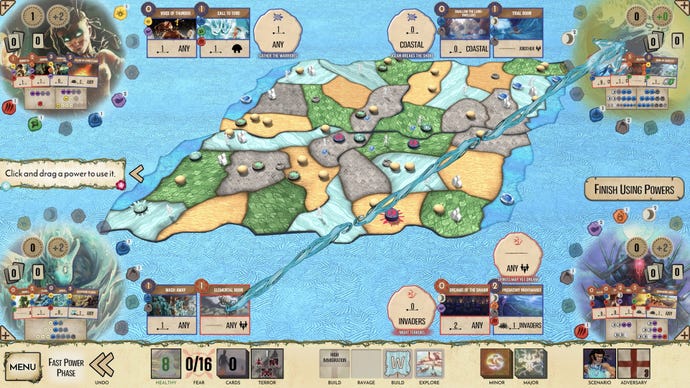
Spirit Island is a proper gem. It’s a cooperative board game in the vein of something like Pandemic that flips the dispiritingly widespread trope of colonial expansion in tabletop games (coughCatancough) on its head.
Rather than the objective being to spread your unwelcome civilisation over lands where you don’t belong, Spirit Island turns you and your companions into deities tasked with fending off the advances of pesky European settlers circa-1700 as they land on an island already inhabited by the Indigenous Dahan (who are fictional, but have plenty of real-world parallels). Each spirit has unique powers you can combo together for satisfying turns where you drive invaders out of the modular board’s regions, gaining more powerful abilities as you instil the English, Swedish or Brandenburg-Prussian interlopers (each with their own distinct traits) with fear.
As a board game, Spirit Island can be a tad intimidating for those looking to step up from the simpler rules of Pandemic - a shame, as it absolutely deserves to become a co-op classic in its own right. The polished PC version solves that problem, handling the crunch for you so you can focus on getting a lot of colonisers to poop their pants. If that’s not worth your money alone, I don’t know what is.
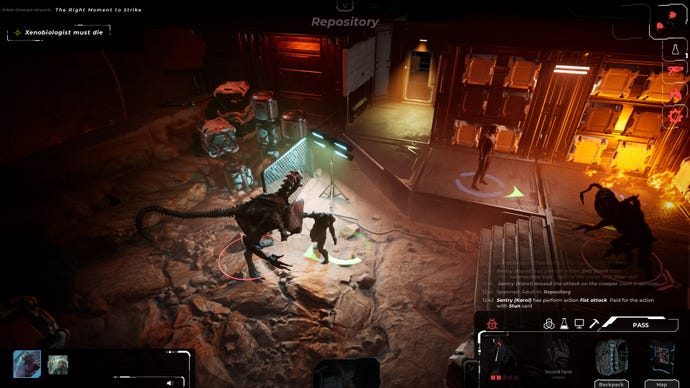
Nemesis: Lockdown - The Board Game could generously be described as “Alien with the serial numbers filed off”. That’s certainly no criticism, as this co-op survival-horror gem gets as close as any tabletop game has to capturing the deadly cat-and-mouse tension of the Greatest Movie Ever Made™.
Its digital adaptation gets even closer to the atmospheric spooks of running around a failing space station chased by unpleasant bio-organisms, turning the require-some-imagination cardboard-and-miniatures of the original into fully 3D levels that make this feel basically like if Alien Isolation was a turn-based RPG. (You can even play solo if you like that alone-in-space horror feel.)
The aim is to try and complete your personal objectives before you get out of dodge, with the main obstacle being a lot of ‘orrible space monsters obsessed with turning you into astronaut mincemeat. You might face some threats from your fellow crewmates too, as their objectives may involve them turning traitor and plotting for your own demise rather than helping you all survive.
Nemesis: Lockdown is wonderfully brutal and punishing, and the perfect antidote for when you trust your friends and fellow human beings a little too much.
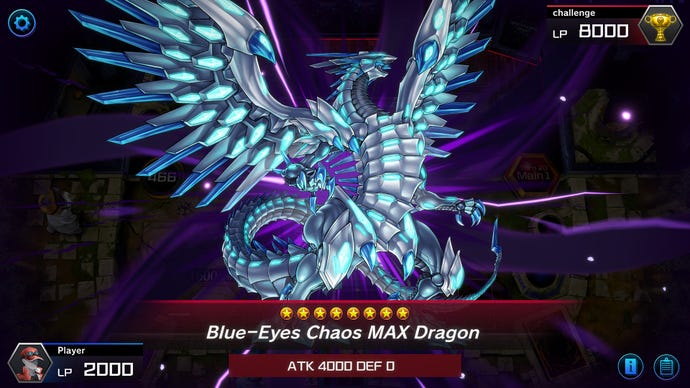
Yu-Gi-Oh! has had plenty of video games in its 25-odd years of being the go-to trading card game for weebs and fans of frankly upsetting levels of text-kerning. Those have mostly been attempts to recreate the experience of being one of its anime characters battling your way through school/the Shadow Realm, rather than a more faithful adaptation of the physical TCG itself.
Master Duel finally gives the veteran card game a proper rival to the likes of MTG Arena, offering up a free-to-play way to get into Yu-Gi-Oh! that doesn’t involve you either having to know the latest anime series or remember exactly how the hell Pendulum Summoning works. (I do this for a job, and I can’t tell you.)
It’s really good too, being both generous with its freebies - you’ll build up packs and gems aplenty, with the option to buy more if you like (of course) - and highly polished in its visuals, with fun animated pals to hang out and watch you from the sidelines and a load of different battlefields that will crack as you take damage. If you’ve always wondered what the fuss is about or just have a hankering to relive days of trading Blue-Eyes White Dragon for Dark Magician on the playground, Master Duel is an excellent way to jump (back) into the card game.
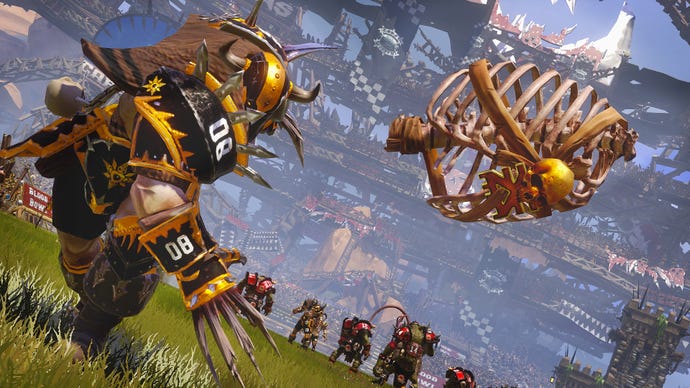
Blood Bowl is a the combination of Warhammer and American Football, and it's execution is so grim, so over-the-top in its brutality, that it's form as a Games Workshop board game with teams of little painted plastic miniatures found popularity in other countries arguably faster than the actual sport.
In Blood Bowl 2, where arguably the spirit of the game has been distilled with more purity than the more recently released Blood Bowl 3, you form a ragtag team of one of eight Warhammer factions - Humans, Orcs, Dwarfs, Skaven, High Elves, Dark Elves, Chaos, and Bretonnia - and replace inter-species war with sportsball. You play the match out as turn based strategy, moving your players one by one up the field to, e.g., get them in a prime reciever position for a pass. Familiarity with standard NFL rules is not necessary, as skirmishes between players here can be fatal, and instead of passing the ball you could yeet another player on your team into the endzone. Or, in the case of some of the larger orcs, eat your teammate.
The animations, from the elves standing their all hoity-toity with their helmets under the arms, to the forces of Chaos barely keeping themselves together, and even the coin toss at the start and celebration dances on scoring, are delightful, and there are a pair of commentators giving appropriate colour, too. It's really hard to dislike Blood Bowl 2, honestly.
Magic: The Gathering is the biggest trading card game in the world. It's been around for decades and taken a few stabs at crossing over to the digital world in that time, but it was only with 2019's Magic: The Gathering Arena that it felt like it really hit its stride on PC. Arena is the same MTG you know from the tabletop, but translated into a fast-flowing, visually impressive app that sees it step up to the likes of digital-only card games such as Hearthstone. Arena also lets you unlock some of the physical cards you buy in the game for free, so you don't need to buy everything twice to keep your collection across paper and pixels.
With plenty of popular Magic: The Gathering formats from the original collectable card game, as well as some new formats exclusive to the digital version, and the chance to play upcoming sets a little ahead of their release, Arena proves MTG isn't going anywhere but up for a while.
Civilisation games were born on the tabletop, with the first - 1980's Civilization by legendary designer Francis Tresham - serving as inspiration for Sid Meier's Civilization series on the PC (which then inspired board games based on the PC games based on the board game; it's a whole thing.) Through The Ages takes the classic genre in a new direction, seeing players build up their empire using little more than a bunch of cards. You draft technology, leaders, wonders and more from a shared queue of cards, making sure to keep your people happy and fed while also fending off attacks from your neighbours.
The tabletop version of Through The Ages is a grand creation that takes hours to play and quite a bit of effort to keep all the cards in the right places. Having all the cardboard admin handled by your PC means you can focus on the game itself - which is a cracker.
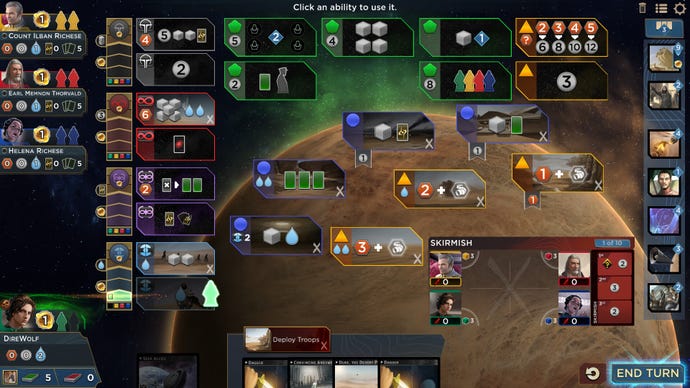
Denis Villeneuve’s recent Dune movies have uncorked the long-blocked reservoir of board games based on Frank Herbert’s sandy, spicy epic space books. While the original Dune board game from 1979 - re-released in 2019 - is still the cream of the crop, Dune: Imperium could well be the best modern Dune game of recent years. And it’s on PC too, fancy that.
Dune: Imperium focuses more on the political manoeuvring and spice-trade of Arrakis than the ruthless backstabbing and betrayal involved. In Imperium, you’re the head of one of the houses competing to control the planet, commanding your agents to go out and collect spice, earn coin and build up your military might to fend off your rival houses’ own machinations.
That boils down to choosing one of several different action spaces each turn, typically giving you something - spice, money, troops, cards - that set you up for gaining victory points. Those VP might come through becoming best pals with the Fremen, Spacing Guild and other factions, warring with your rivals during a combat phase at the end of each round, or simply just trading shedloads of precious melange. Ideally, you’ll want to be doing a bit of everything.
While the UI looks a bit overwhelming at first - christ, that’s a lot of boxes and icons - I assure you Dune: Imperium is actually fairly easy to pick up. Once you’ve got the basics down, it’s a seriously moreish experience against AI opponents (Duke Leto can do one) or friends and strangers online - which might well include reigning champ MrBeast, who knows. I fell into an Imperium hole myself shortly after it hit Steam, playing a couple of games each evening thanks to the polished app, grabby gameplay and my dedication to getting crushed by Oscar Isaac. I’m sure I’m not alone in that desire.
Sure, building railways is great. But have you ever wanted to rob a train instead? If so, you should probably find a new ambition, but Colt Express will let you live out your fantasies of being like Jesse James by rootin', tootin' and shootin' your way through a Wild West train heist. Everyone chooses an action to take each turn in secret, before they all play out in the order they were played - leading to inevitable chaos. You might go to blast a rival only to find they've scarpered onto the roof of the carriage, or make a move to grab some loot just as somebody pinches it right in front of you.
Meanwhile, the marshal is on the hunt for the outlaws and will fill you full of lead if you end up in the same carriage, making it harder to draw a decent hand on future turns. On the tabletop, Colt Express already packed a visual punch thanks to an impressive 3D cardboard train - on PC, it looks just as stylish thanks to some slick animation and strong cartoon artwork. Hop on board and have a blast.
Set during the Cold War, Twilight Struggle is almost as tense as the period that inspired it. Two players each take control of the US and USSR, working to exert their influence over the rest of the world as the nuclear threat simmers over to boiling point. Each card is based on actual historical events, with particular actions increasing the DEFCON level and driving either side closer to the brink of nuclear war.
While the rules aren't complicated by themselves, play gives way to a deep level of strategy that will keep you trying to outplay your opponent throughout. The political tug-of-war has long been considered one of the greatest board games of all time on the tabletop, and its digital adaptation does it ample justice. How many other games have the chance of ending in mutually-assured destruction?
Splendor is a gem of a game about gems. You're aiming to collect the most valuable cards by buying them using a combination of gem chips in various colours - which you can pick up each turn - and cards you've bought on previous turns that are worth permanent gems in your collection. As you buy more cards, you can afford even more expensive cards from the grid, giving the game a satisfying sense of momentum. Add in the race to collect bonuses for claiming certain sets of cards, and the passive-aggressive nature of reserving cards your opponents may want to stop them cashing in, and you can see why Splendor's one of the best quick(ish) board games of the last decade.
If you're looking for something to pick up after the likes of Catan and Carcassonne, start here.
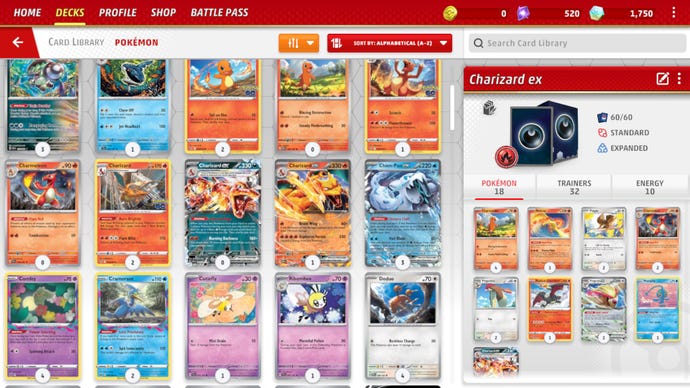
Remember being a kid, clutching your deck of cards in your sweaty hand and getting so het up about them that eventually your school banned Pokémon cards from the premesis because the children were all taking it Too Seriously? Having that laminated folder with the space all ready for a Shiny Charizard? You can still play Pokémon with physical cards, of course, but now there's an offical, easier alternative. Pokémon TCG Live: I choose you!
This has all your standard Pokémon stuff, but in digital form. You can with your custom decks, and battle against friends and strangers in tournaments or quickie battles, all in a swish digital arena. TCG Live replaced TCG Online in 2023, and a big change is that, despite the name implying trading it ditched the trading marketplace in favour of a crafting system, more in line with other modern card games.
Though this does remove the trading bit of Pokémon that you remember being of life or death importance when you were 9, it has made the game more free-to-play friendly, putting paid to the absurd pricing you'd see in the market place. Very little of the magic is lost in this version, and in fact it's better in some ways because you don't have to deal with that whole thing where someone "accidentally" knocks the damage tokens and then spends ages arguing about how many HP their Gastly actually has left.
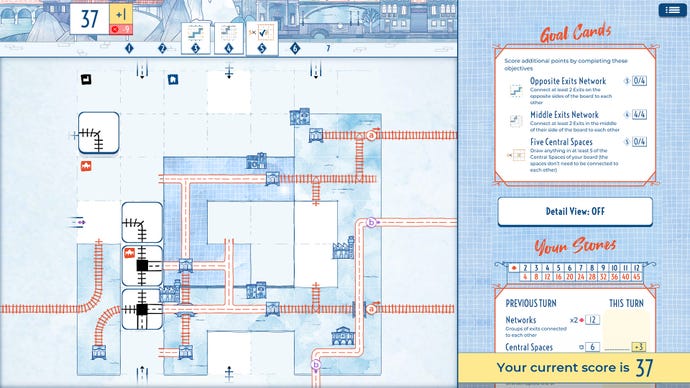
Railroad Ink Challenge is a streamlined version of a popular board game called Railroad Ink (and there's a physical version of both the original Railroad Ink and of Challenge too, if you like what you play). It's a rip-roaring good time, combining speed and expansion with the need for careful planning.
Games of this go quickly: you only have seven turns, building as much of your transport network out as possible. You need to connect exits around your particular board, and get points for growing your network with motorways, bridges, stations, that kind of thing. But you also lose points for any connections you leave unfinished at the end, which is where that careful planning comes in. And as ever, there's the addition of random chance with dice rolls - though Railroad Ink Challenge also throws in timed optional challenges to keep you on your toes. The quick way games play out gives this the "Just one more!" flavour of Pringles or a bag of popcorn, so it really blends the best of board games with all the advantages that a digital game offers.
Set in an alternative 1920s dieselpunk Europe where mechs are the latest innovation in war machinery, Scythe is an immersive strategy game where five different factions are all looking to stake their claim to the land around a mysterious city-state known as The Factory. Each of the factions has different starting abilities, but all can invest in their workers, mechs and buildings during the game to gather more resources, traverse the land and drive off their rivals in combat they have full control over.
With numerous ways to build your strength and amass points, Scythe opens up into a fascinating 4X experience with the lore and story of its world delivered through events and player decisions as they explore. Little wonder that artist Jakub Rozalski's evocative 1920s-ish setting - which serves as the engrossing backdrop to Scythe - has since been expanded with video game Iron Harvest.
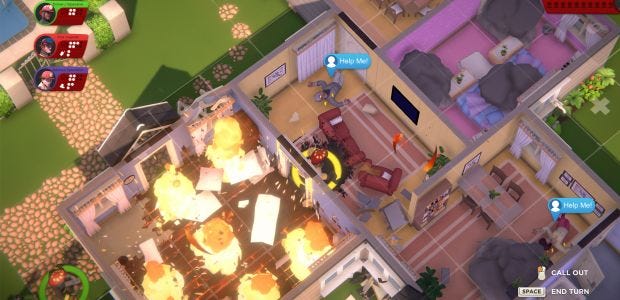
Flash Point is the hottest board game on the tabletop - literally. Players are firefighters tackling burning blazes together, moving their squad of extinguishing experts through different buildings to put out flames and rescue survivors trapped inside.
Like in co-op board game classic Pandemic (which we haven't included on this list because frankly its PC version sucks), the players' characters have different unique abilities to help them triumph. It's how you use your team's talents - from smashing through walls to reviving unconscious survivors - and coordinate your plan that'll decide how you fare, though don't expect it to be easy.
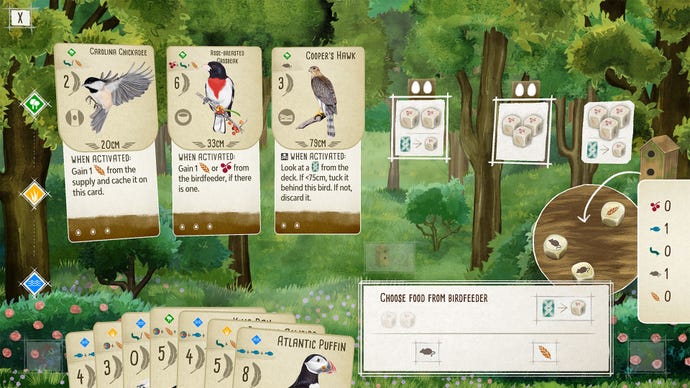
Wingspan has been shouted out on RPS before, once making it into our Steam Fest best demos list as well as turning up in our Indies Uncovered streams. Matt Cox (RPS in peace) described it as an engine-building game, "where you start with nothing and wind up with a beautiful, point-spewing machine". In Wingspan's case this machine is made of birds.
Wingspan's cardboard version won awards, so you know it's worth a look. A card game at heart, Wingspan encourages you to both plan for long term gains and take advantage of opportunities on the spur of the moment. Bird and egg cards are the meat of your game, earning you victory points but also giving you abilities that might undercut opposing players. And like birds themselves, you'll need to quickly adapt to a changing environment, as your nests and abilities keep pace with what your opponent is up to. It's a game where you can be pipped to the post by the luck of the draw at the very last moment.
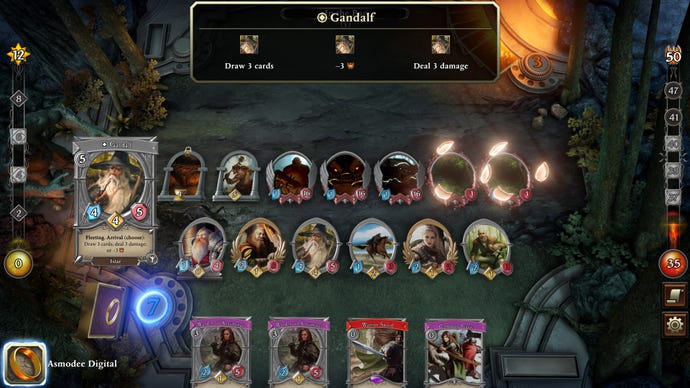
Less a perfect digital recreation of the excellent co-op living card game The Lord Of The Rings: The Card Game and more a game of its own that takes heavy inspiration from its tabletop cousin (not to mention more than a splash of Hearthstone's visual style), LOTR: Adventure Card Game sees players' own fellowship braving the monsters of Middle-earth on a number of quests. You get to customise your deck of cards with characters, abilities and more, before seeing how it stacks up against the forces of darkness controlled by the computer's Sauron. The game nails the sense of adventure from Tolkien's books, journeying through different locations and throwing up a variety of objectives for players to complete along the way. It's also bloody tough; Sauron doesn't mess around.
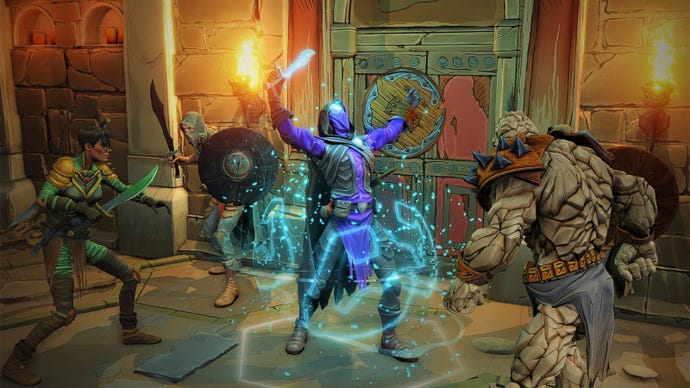
Gloomhaven is a big hit in its physical format, so no suprise that the digital version is - even though it's still in early access. Gloomhaven marries tactical RPG elements with dungeon crawling (everyone's favourite hobby), and does so in some style.
Take control of your squad of weird and wonderful mercs to clear trade routes, open up the fantastical world again, and make loads of money in the process. There's a range of different characters to choose from that stick with the RPG, D&D-esque classes you might be used to, but add unique spin. You've got the Soothsinger, which is a bard class, and the Scoundrel for fans of rogues, but then you also have classes like the Cragheart, an incredibly diverse class that can be specced for support, ranged attack or even a bit of tanking.
Your squad dives into dungeons to face off against various beasties and monsters in strategic combat that involves drawing cards, playing abilities, and keeping an eye on your exhaustion level, lest you have to force a retreat before you're ready. Digi-Gloomhaven is nearly its full release, and has added online co-op and new monsters to contend with. Things have never looked gloomier!
With its stark black and white pieces, Hive instantly brings to mind chess. And, honestly, it wouldn't be too much to say it should go on to become as much of a classic. Similarly a battle of abstract strategy between two players, Hive challenges each side to surround their opponent's queen bee by manoeuvring their creepy-crawly pieces around the connected tiles. Each bug moves in a unique and specific way made easy to remember by the insect pictures - the spider crawls an exact number of spaces, the grasshopper jumps over pieces, the beetle crawls on top of other pieces. and so on. It's an intense challenge of careful planning ahead and outwitting your opponent that you'll want to master.
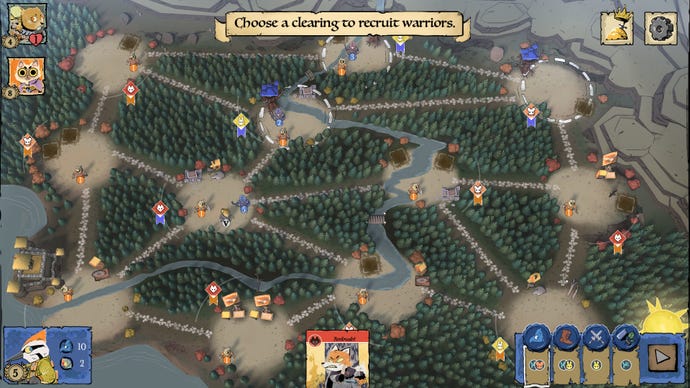
Root is so popular as a board game that whenever a new run of it is released into the wild, it quickly goes out of stock again. Thankfully the digital version exists to give us all a chance to conquer the forest. It's a strategy game for 2-4 players with a bit of an asymmetrical tilt. Each player is controlling a faction trying to gain control of a vast woodland wilderness. The Marquise de Cat, the kind of Saruman-esque baddie harvesting the forest to feed industrial expansion, is up against the coalition of the Woodland Alliance, and The Eyrie Dynasties of big birds who ruled the forest before the Marquise took over. And then there's the Vagabond, who's mostly out for himself... unless he isn't?
Each side gains victory points in different ways, and has different advantages and disadvantages in play. The dice rolls and cards you use to win fights and make different plays mean there's a delicious edge of random chance that could tip things in anyone's favour. There have been updates to the base game as well, with the most recent Riverfolk DLC adding two new factions to the mix. Root is so good that whenever you mention it to someone who plays it, they look away from you, eyes unfocused, and go: "God... Root is good though."
For more board game and tabletop recommendations, reviews, news and video playthroughs, head over to Rock Paper Shotgun's sibling site Dicebreaker.
Read Again https://news.google.com/rss/articles/CBMiN2h0dHBzOi8vd3d3LnJvY2twYXBlcnNob3RndW4uY29tL2Jlc3QtYm9hcmQtZ2FtZXMtb24tcGPSAQA?oc=5Bagikan Berita Ini
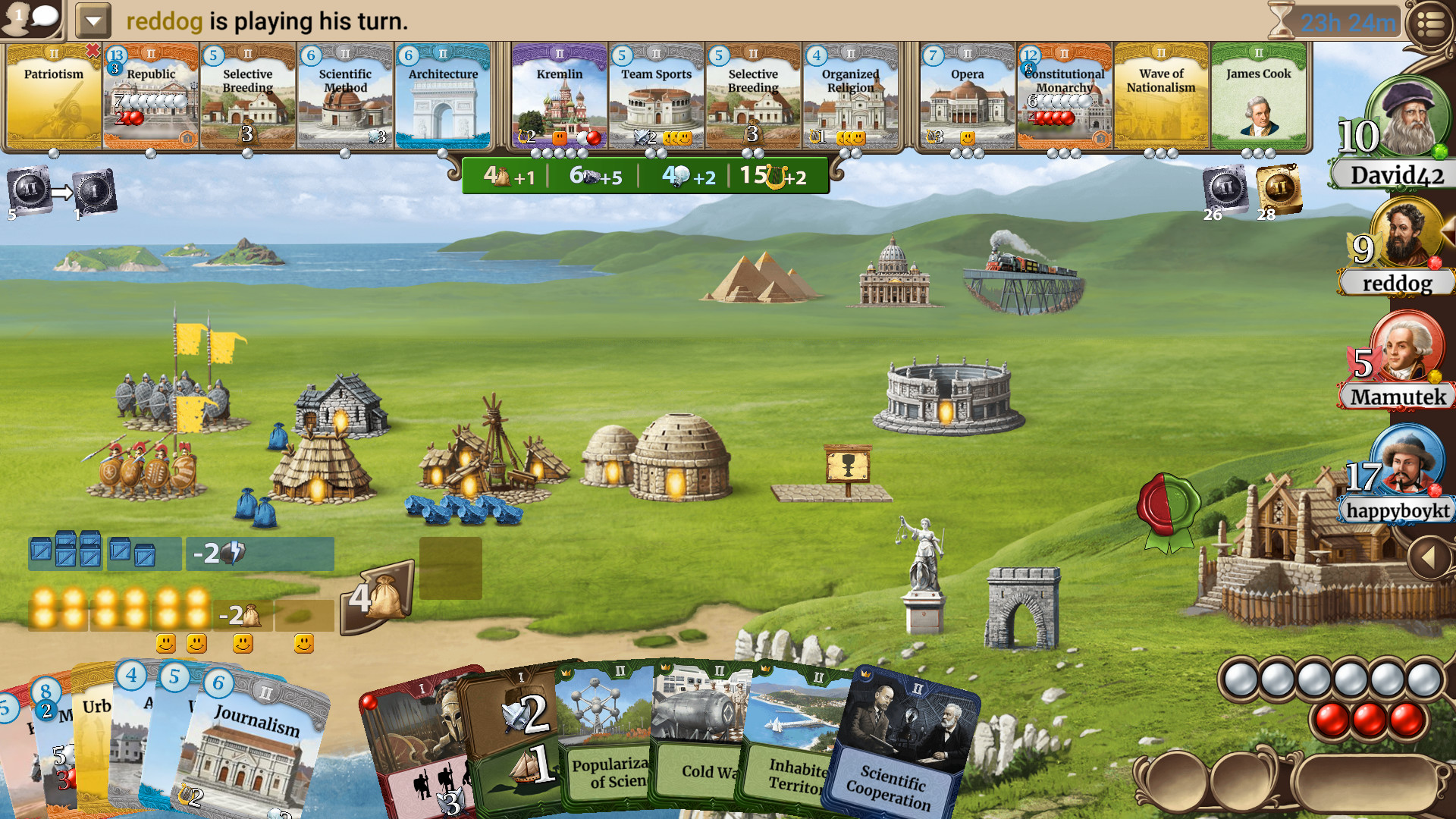
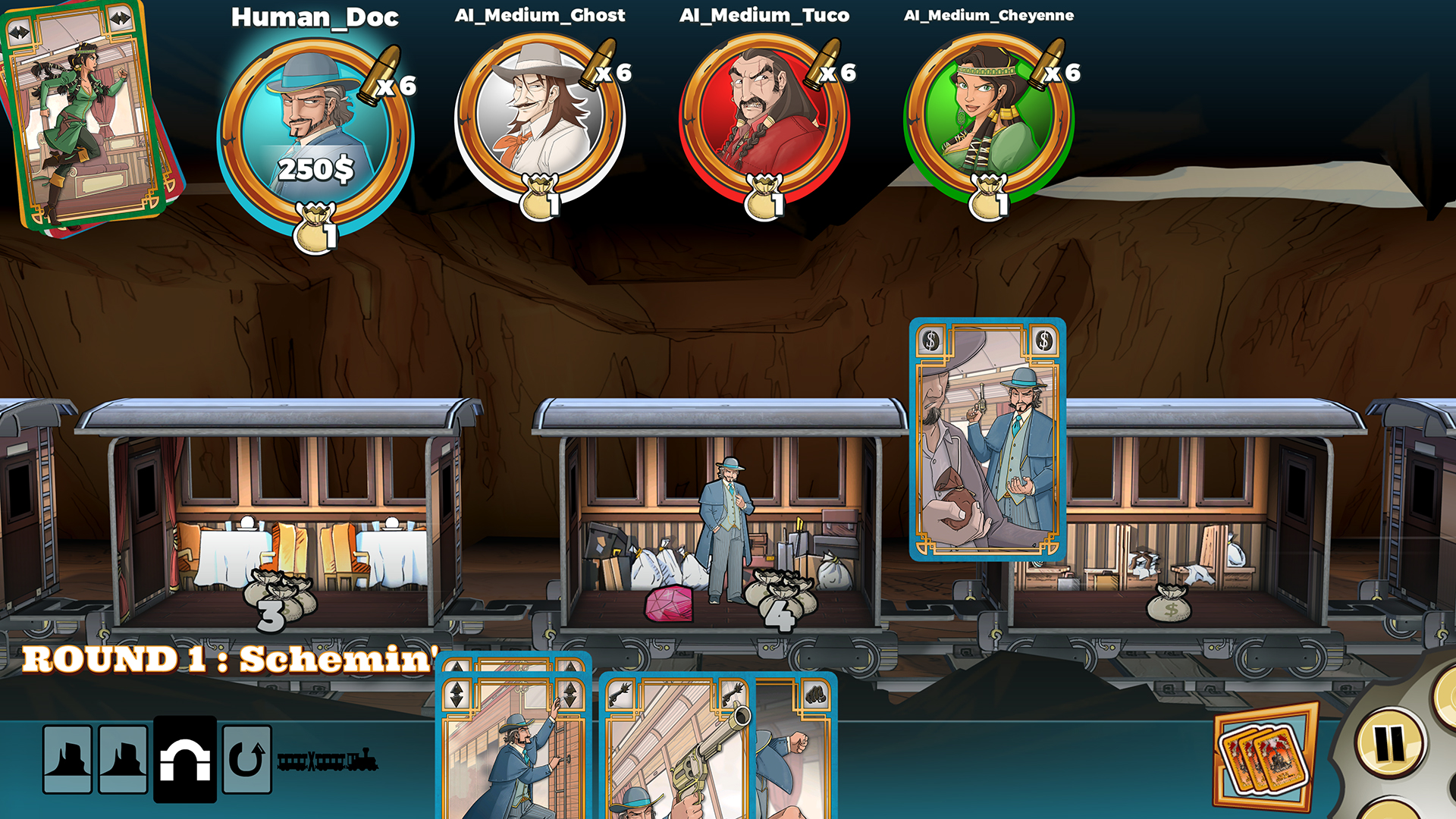
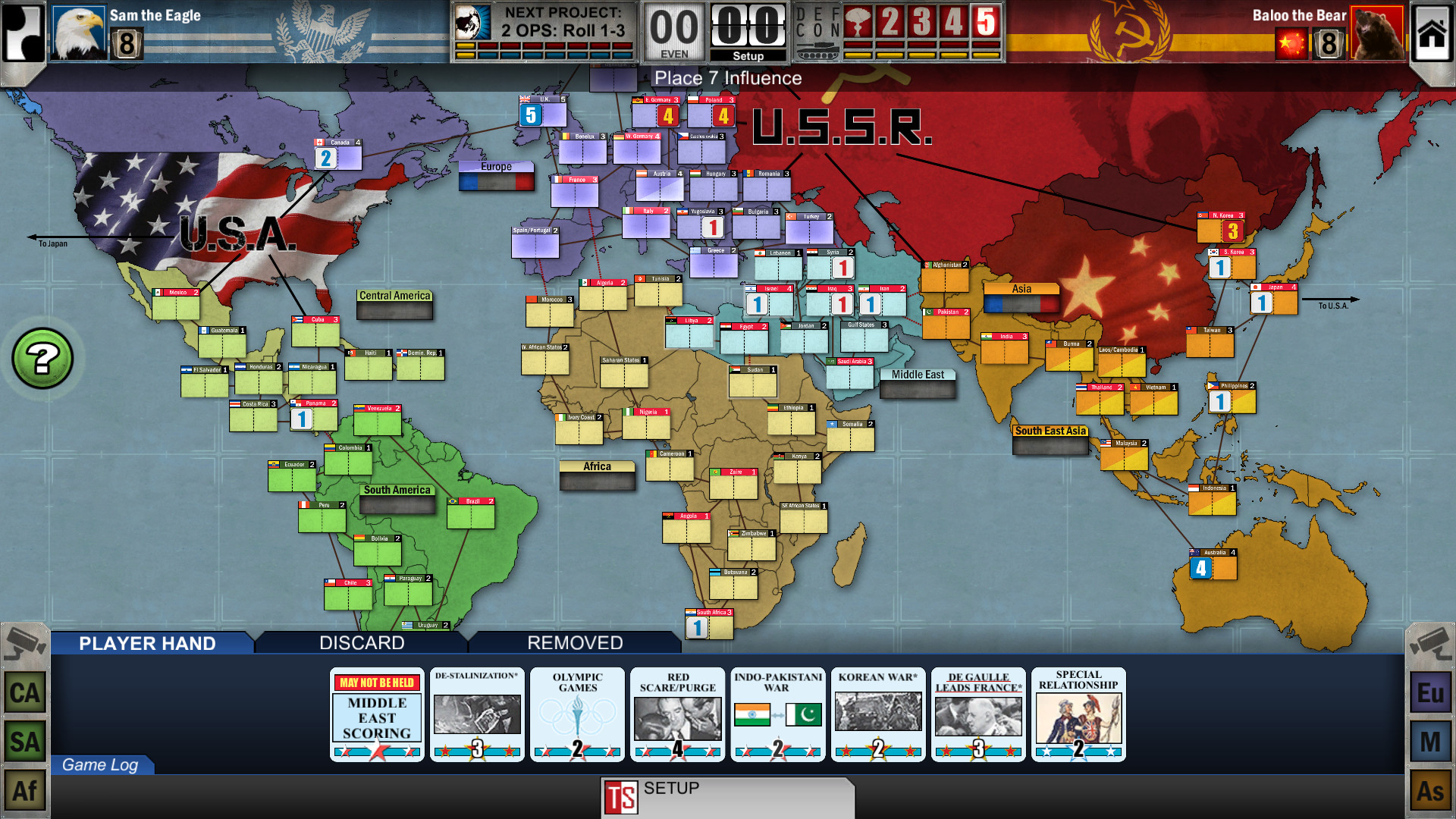
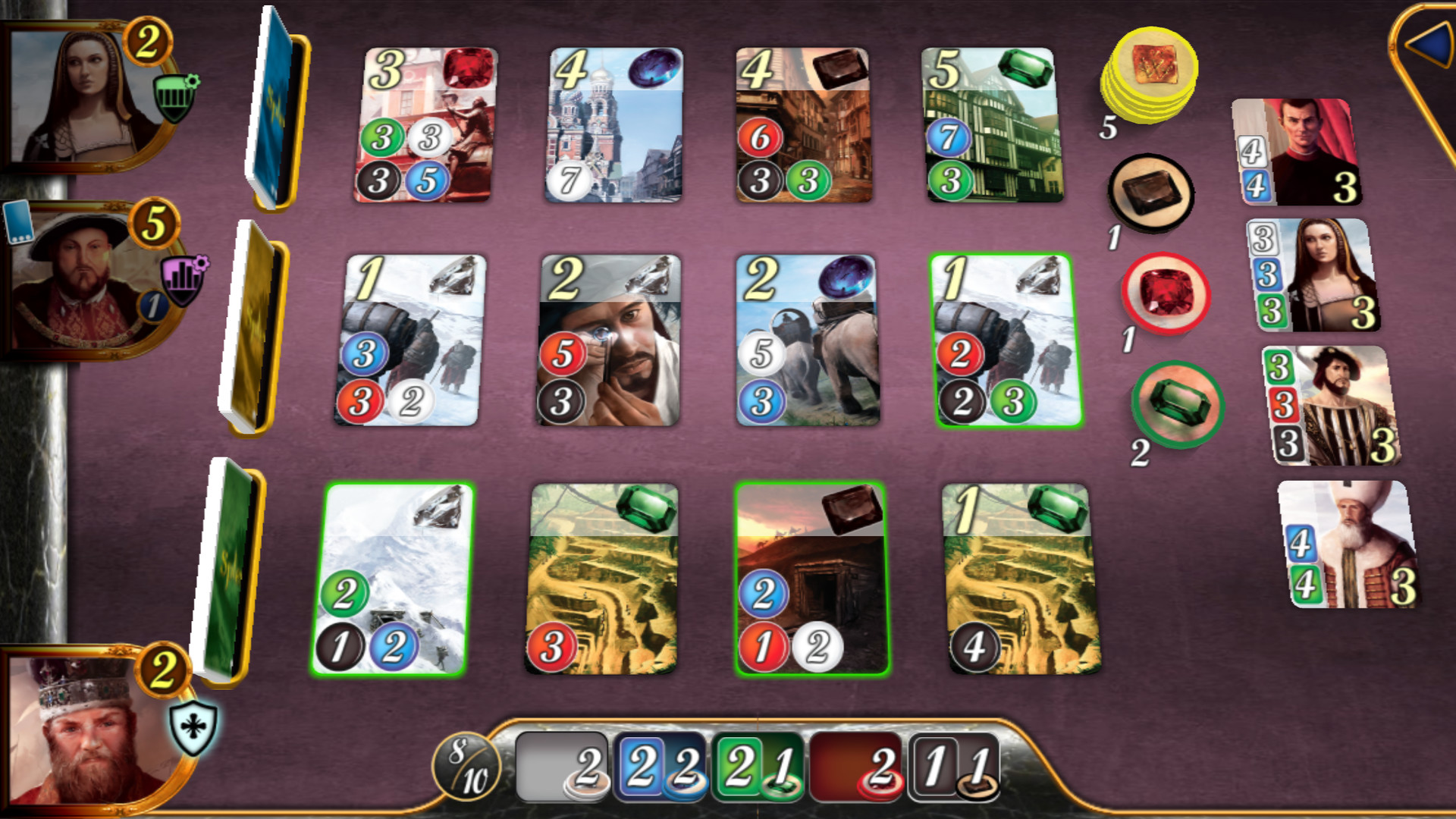
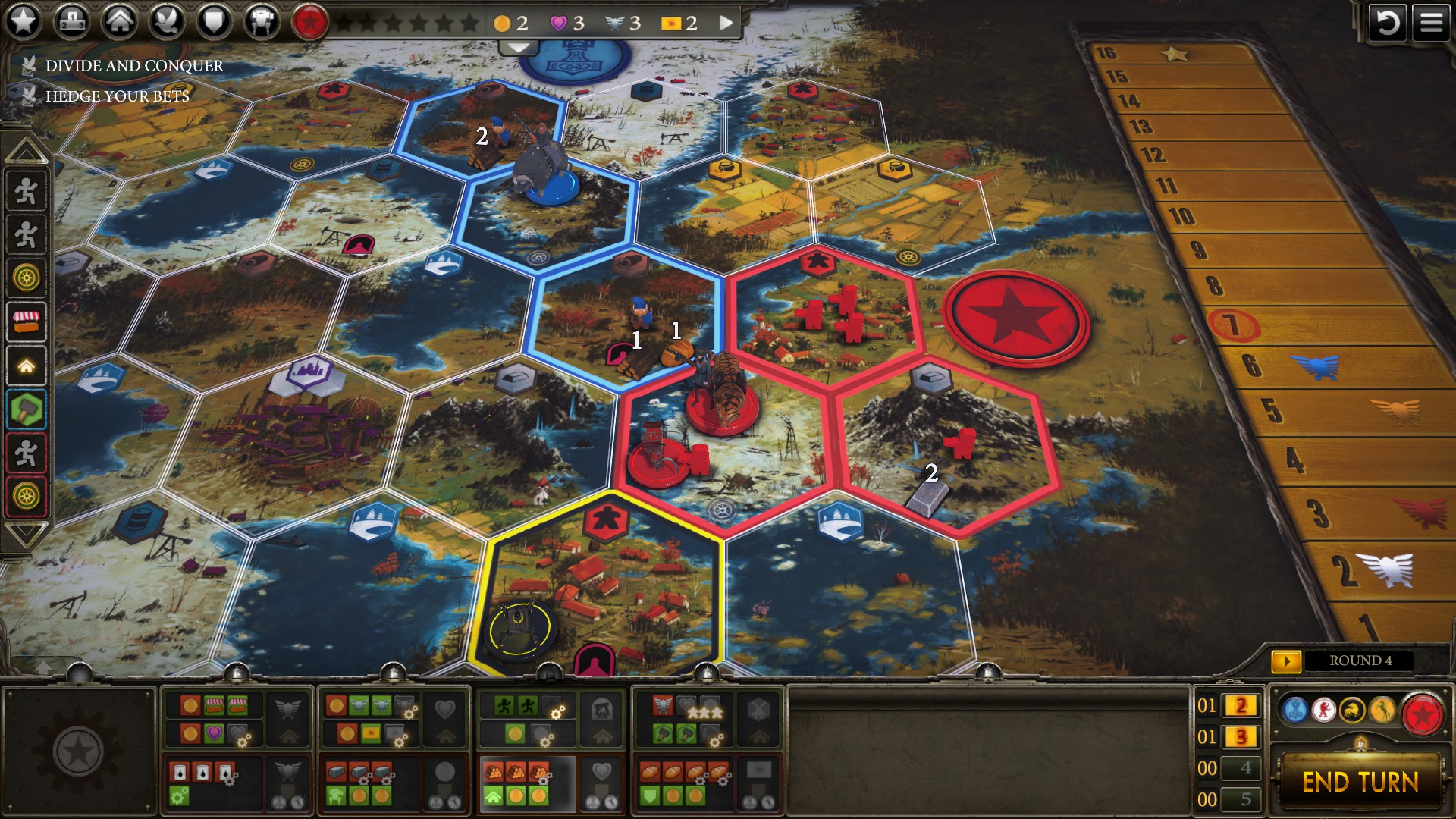
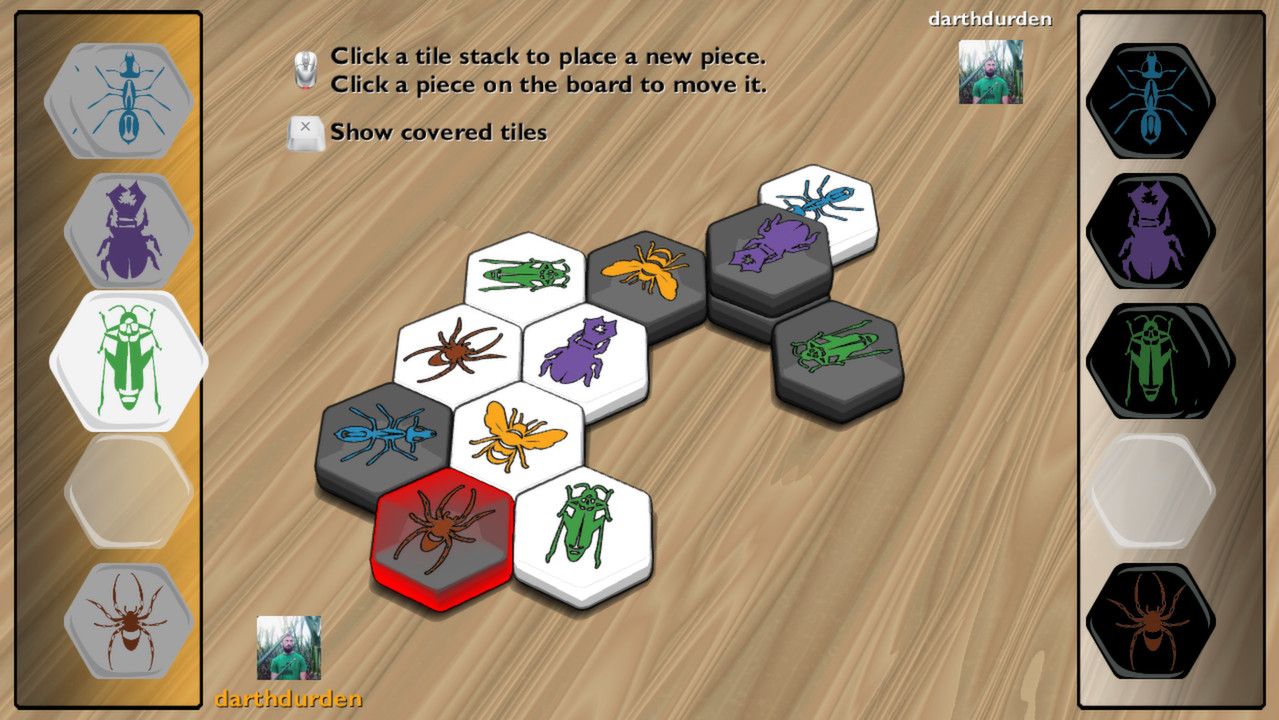














0 Response to "The 15 best online board games on PC - Rock Paper Shotgun"
Post a Comment